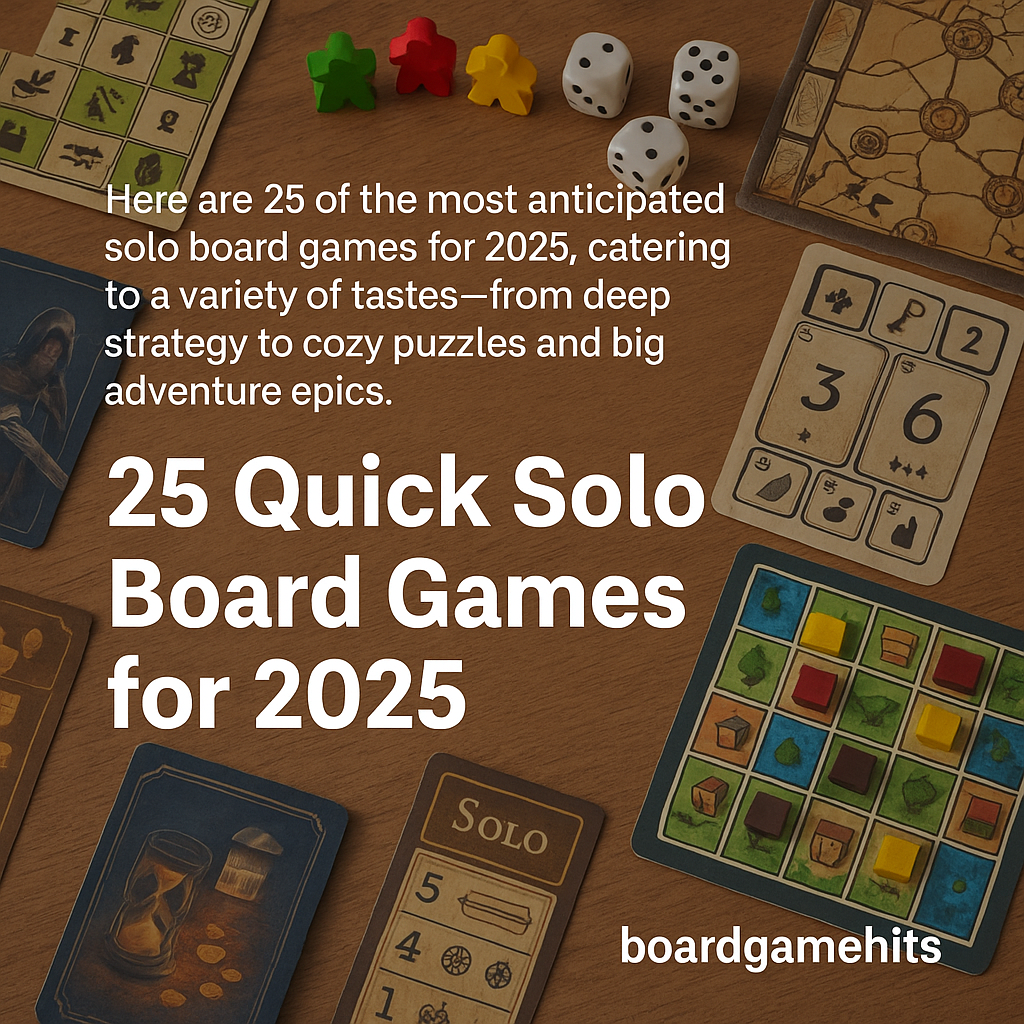Solo gaming is now mainstream. Publishers are designing specifically for one-player sessions instead of tossing in half-hearted automa. The result: 2025 is stacked with titles covering every niche, from crunchy euros to narrative-driven adventures and even cosy puzzles.
Here’s the rundown of what’s coming — with notes on why each deserves attention.
1. Unstoppable
- Designer: John D. Clair
- Publisher: Renegade Game Studios
- Mechanics: Cooperative, deck construction, card crafting
- Highlights: Rogue like deck-builder with dual-purpose cards. You’re not only building your deck, you’re also powering up the enemies. A proper challenge for solo puzzle solvers who don’t want a scripted AI.
Links:
Official Game Page | BoardGameQuest Review
2. Moon Colony Bloodbath
- Designer: Donald X. Vaccarino
- Publisher: Rio Grande Games
- Mechanics: Engine-building, tableau management
- Highlights: Chaotic engine-building with a lunar setting, layered with dark humour. Solo players manage disasters, disasters, and more disasters.
3. Marvel Dice Throne Missions
- Designers: Gavan Brown, Nate Chatellier
- Publisher: Roxley
- Mechanics: Dice rolling, cooperative
- Highlights: Quick-fire solo missions with Marvel heroes. It ditches campaign bloat for instant superhero action.
4. Vantage
- Designer: Jamey Stegmaier
- Publisher: Stonemaier Games
- Mechanics: Sandbox adventure, dice rolling
- Highlights: 800 locations to explore on a new planet. It’s sandbox design, not linear campaign—jump in, wander, jump out. Replayability baked in.
5. The Anarchy
- Designer: Bobby Hill
- Publisher: Garphill Games
- Mechanics: Flip-and-write, multi-use cards, tech trees
- Highlights: Five rounds of medieval chaos. A strategic cousin to Hadrian’s Wall. Short play, crunchy decisions.
6. Mage Knight: The Apocalypse Dragon
- Designer: Phil Pettifer
- Publisher: WizKids
- Mechanics: Campaign, scenario-driven
- Highlights: Expansion for one of the most enduring solo games. New hero, campaign, and a dragon threat scaled up to apocalypse level.
7. Coming of Age
- Designer: Dani Garcia
- Publisher: Ludonova
- Mechanics: Narrative, dice management
- Highlights: Narrative game where you shape a life from childhood to adulthood. Driven by dice choices. Personal, reflective, very different from the usual dungeon crawl.
8. How to Save a World
- Designer: Yuval Grinspun
- Publisher: Burnt Island Games
- Mechanics: Worker placement, deck-building
- Highlights: Save Earth from an asteroid. Tense resource crunch, tight decision space.
9. The Elder Scrolls: Betrayal of the Second Era
- Designers: Josh J. Carlson, Michael Gernes, et al.
- Publisher: Chip Theory Games
- Mechanics: Cooperative, modular board, campaign
- Highlights: Elder Scrolls meets Too Many Bones. Rich solo narrative, lavish production.
10. House of Fado
- Designers: Vital Lacerda, João Quintela Martins
- Publisher: Eagle-Gryphon Games
- Mechanics: Worker placement, commodity speculation
- Highlights: Run a Portuguese restaurant. It’s cultural, thematic, and predictably heavy given Lacerda’s name on the box.
11. Luthier
- Designers: Dave Beck, Abe Burson
- Publisher: Paverson Games, Funtails
- Mechanics: Worker placement, auction
- Highlights: Crafting instruments through auctions and bidding. Solo mode designed with proper depth.
12. A Place for All My Books
- Designers: Alex Cutler, Michael Mihealsick
- Publisher: Smirk & Dagger Games
- Mechanics: Pattern building, worker placement
- Highlights: Cosy solo puzzle about library organisation. Not for adrenaline junkies—this is a slow-burn, relaxing title.
13. Keyside
- Designers: Richard Breese, Dávid Turczi
- Publisher: R&D Games, HUCH!
- Mechanics: Dice-driven worker placement
- Highlights: Manage boats and harbours with Turczi’s trademark solo mode. Expect clever AI opposition.
14. Terraria: The Board Game
- Designer: Chris Kingsnorth
- Publishers: Paper Fort Games, Re-Logic
- Mechanics: Modular board, deck-building, cooperative
- Highlights: Brings the sandbox video game to cardboard. Dig, fight, build. Designed with solo in mind.
15. Citizens of the Spark
- Designer: Philip duBarry
- Publisher: Thunderworks Games
- Mechanics: Tableau building, set collection
- Highlights: Animal-themed engine building with ridiculous replayability. Combos everywhere.
16. Speakeasy
- Designer: Vital Lacerda
- Publisher: Eagle-Gryphon Games
- Mechanics: Worker placement, hand management
- Highlights: Manage a prohibition-era empire. Solo play keeps the tension of juggling demand and risk.
17. Clandestine
- Designer: Jason Brooks
- Publisher: Brookspun Games
- Mechanics: Rondel, modular board, multi-use cards
- Highlights: Secret societies, modular systems, high replay value.
18. Great Western Trail: El Paso
- Designers: Johannes Krenner, Alexander Pfister
- Publisher: Lookout Games
- Mechanics: Deck-building, tableau, set collection
- Highlights: Faster, more compact variant of the classic euro, now with a sharp solo mode.
19. Revenant
- Designer: Allan Kirkeby
- Publisher: Mindclash Games
- Mechanics: Worker placement, area majority
- Highlights: Solo-heavy euro inside the Voidfall universe. Epic scale, deep tactics.
20. Clans of Caledonia: Industria
- Designer: Juma Al-JouJou
- Publisher: Karma Games
- Mechanics: Automa, contracts, network building
- Highlights: Expansion adds solo automa, replicating a proper multiplayer experience.
21. Behold: Rome
- Designer: Joe Klipfel
- Publisher: Mythfield Games
- Mechanics: Civilisation-building, multi-use cards
- Highlights: Card orientation creates unique solo puzzles. Compact yet clever.
22. Shifters
- Designer: Jean Philippe Sahut
- Publisher: La Boîte de Jeu
- Mechanics: Deck-building, campaign
- Highlights: Roguelite adventure with team-building and meta-progression. Think Dead Cells in cardboard form.
23. 20 Strong: Tanglewoods Red
- Publisher: Chip Theory Games
- Mechanics: Solo dice adventure
- Highlights: Fairy-tale dice crawl, part of the 20 Strong series. Beautiful art, fast play.
24. Vestige
- Designer: Marc Neidlinger
- Publisher: Orange Nebula
- Mechanics: Tableau building, modular board
- Highlights: Post-apocalyptic euro with solo AI. Resource “alchemy” system keeps each play unique.
25. Tend
Highlights: Cosy game of crops and animals with solo progression and online competition via app.
Designers: Max Anderson, Zac Dixon, et al.
Publisher: IV Studio
Mechanics: Flip-and-write, chaining
Solo board gaming in 2025 is not an afterthought. It’s as varied and ambitious as the rest of the hobby. Whether you want massive campaigns (Revenant, Elder Scrolls), abstract euro puzzles (The Anarchy), or calm, restorative play (Tend, A Place for All My Books), the year has it covered.
Games Haven
From epic campaigns to cosy puzzles, here are the top upcoming titles shaping the future of one-player board gaming.
Solo board gaming in 2025 is not an afterthought. It is a design focus in its own right, no longer a side mode stapled to the back of a rulebook. For years players had to rely on awkward automa or unofficial fan fixes to make games viable alone.. That era is fading. The new slate of releases shows how far things have come.
At one extreme you have campaign-heavy titles such as Revenant and The Elder Scrolls: Betrayal of the Second Era. These are built for immersion over the long haul, not just one-off sessions. They carry narrative arcs, sprawling systems, and enough material to last through repeated play. Solo players who treat their shelves as a library of worlds will find them irresistible. They are designed to be revisited, not completed once and put away.
At the other end sit smaller, quieter designs like Tend and A Place for All My Books. These games offer something different: space to pause, reflect, and play without stress. A flip-and-write about gardening, or a puzzle about arranging books, may sound slight compared to a galactic saga, but the appeal is obvious once you sit down with them. They provide calm, a sense of order, and closure in less than an hour. For solo players who do not always want spectacle, they will be just as important as the headline acts.
Between these poles you find the mechanical euros. The Anarchy, How to Save a World, and Keyside represent the modern state of solo optimisation. These are games of efficiency, multi-use cards, and puzzle-like planning. What matters is that the solo design is no longer an afterthought. Automa and AI systems are tested with the same care as the core rules. Playing alone feels as deliberate as sitting across from an opponent. For those who want the bite of a proper euro without needing a group, this matters more than presentation or theme.
The real strength of 2025 is not just quantity but diversity. Chip Theory continues to refine its premium dice-driven systems with 20 Strong: Tanglewoods Red. Orange Nebula is reworking the structure of Vindication into Vestige, aimed squarely at soloists. Stonemaier is trying something unusual with Vantage, a pure sandbox with no campaign rails, promising open exploration in a way few solo games have attempted. None of these projects feel lazy or opportunistic. Each has a distinct vision of what solo gaming should be.
This breadth underlines a shift in how the hobby now treats solo play. It is not filler, not an appendix, and not a compromise. It is an entire design space with its own traditions and its own expectations. The sheer variety of titles proves the point. If you want to invest in a multi-session epic, there is a release ready to take that slot. If you want a puzzle to play on a weeknight, you will find several contenders. If you prefer tactical combat or economic systems, the market finally has options that deliver without needing opponents.
The significance of this cannot be ignored. A decade ago, most solo players were cobbling together makeshift variants or tolerating half-hearted bots. Now publishers put solo design on equal footing with multiplayer, building it into the game from the ground up. That change is cultural as much as commercial. It reflects an understanding of how people actually play, and an acceptance that solo players are not a fringe audience but a substantial part of the hobby.
2025, then, is more than a busy release calendar. It is a clear statement. Solo is not secondary. It is ambitious, experimental, and central to the future of board gaming. From sprawling universes to pocket-sized puzzles, the coming year makes one thing obvious. Playing alone is no longer a fallback. It is the main event.



Comments are closed